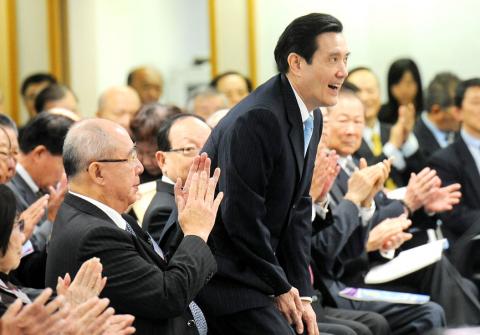President Ma Ying-jeou’s (馬英九) administration yesterday came under criticism during the Chinese Nationalist Party’s (KMT) 19th Central Review Committee over its handling of the political crisis involving Legislative Speaker Wang Jin-pyng (王金平).
The crisis arose from Ma’s attempt in September to remove Wang — both from the party and as speaker — after receiving information from Special Investigation Division (SID) Prosecutor-General Huang Shih-ming (黃世銘) on Aug. 31 that Wang allegedly lobbied former minister of justice Tseng Yung-fu (曾勇夫), High Prosecutors’ Office head prosecutor Chen Shou-huang (陳守煌) and High Prosecutors’ Office prosecutor Lin Shiow-tao (林秀濤) not to appeal against the acquittal of Democratic Progressive Party (DPP) caucus whip Ker Chien-ming (柯建銘) in a breach of trust case.
Chen Keng-chin (陳庚金), a heavyweight from Greater Taichung’s “Black” faction, told Ma during the meeting that the government’s “news releases were officious, flowery and impractical,” adding that his administration’s responses — when it responded at all — avoided the issues, were one-sided and tended to mask the severity of the problem.

Photo: Chu Pei-hsiung, Taipei Times
Chen also said that Ma’s attempt to remove Wang from the party was not in accordance with protocol, adding that it raised doubts about how staff could act according to Ma’s professed core values of justice and equality.
Chen said that prior to the meeting, he had e-mailed an additional copy to KMT Secretary-General Tseng Yung-chuan (曾永權) as well as Ma himself, but he had not received a reply from either man, adding that the party’s higher-ups had also asked party heavyweights like Chan Chun-po (詹春柏) and Hsu Li-teh (徐立德) to talk to him in the hopes of “smoothing things out.”
Chen said that the party’s responses in either respect were “hard to accept.”
Former Taiwanese provincial governor Chao Shou-po (趙守博) also said that the Ma administration’s actions were very much like the Rectification Movement enacted by the Chinese Communist Party (CCP) from 1942 to 1944, adding that all participants in the decisionmaking process in the party and administration needed to reflect on their actions and attitudes.
The Yanan Rectification Movement was the first ideological movement the CCP had enacted, cementing Mao Zedong’s (毛澤東) role in the party’s leadership, both politically and ideologically, through the removal of opponents and making Mao’s philosophies dominant.
In the face of Ma’s plummeting support and the popular practice of throwing shoes at the president, former minister of justice Hsiao Tien-tzang (蕭天讚) said the party should defend and support Ma.
Hsiao said that such acts should not be tolerated and should be dealt with using the full force of the law.
“We cannot allow such violent actions against the head of state that have begun recently to continue. While it is normally tolerable, it not only violates personal rights, but damages the respect the head of state, and the party chairman, should receive,” Hsiao said.
Hsiao also supported Ma’s actions during the “September strife,” saying that Ma had made a “clear and wise move” in the lobbying case.
Ma had chosen to tolerate criticism that he does not know right from wrong, but “too much tolerance will only be ridiculed as weakness and incompetence” and there should be limits to the tolerance the party shows, Hsiao said, adding that he was certain all who were present at the congress knew what he meant.

SECURITY: As China is ‘reshaping’ Hong Kong’s population, Taiwan must raise the eligibility threshold for applications from Hong Kongers, Chiu Chui-cheng said When Hong Kong and Macau citizens apply for residency in Taiwan, it would be under a new category that includes a “national security observation period,” Mainland Affairs Council (MAC) Minister Chiu Chui-cheng (邱垂正) said yesterday. President William Lai (賴清德) on March 13 announced 17 strategies to counter China’s aggression toward Taiwan, including incorporating national security considerations into the review process for residency applications from Hong Kong and Macau citizens. The situation in Hong Kong is constantly changing, Chiu said to media yesterday on the sidelines of the Taipei Technology Run hosted by the Taipei Neihu Technology Park Development Association. With

CARROT AND STICK: While unrelenting in its military threats, China attracted nearly 40,000 Taiwanese to over 400 business events last year Nearly 40,000 Taiwanese last year joined industry events in China, such as conferences and trade fairs, supported by the Chinese government, a study showed yesterday, as Beijing ramps up a charm offensive toward Taipei alongside military pressure. China has long taken a carrot-and-stick approach to Taiwan, threatening it with the prospect of military action while reaching out to those it believes are amenable to Beijing’s point of view. Taiwanese security officials are wary of what they see as Beijing’s influence campaigns to sway public opinion after Taipei and Beijing gradually resumed travel links halted by the COVID-19 pandemic, but the scale of

A US Marine Corps regiment equipped with Naval Strike Missiles (NSM) is set to participate in the upcoming Balikatan 25 exercise in the Luzon Strait, marking the system’s first-ever deployment in the Philippines. US and Philippine officials have separately confirmed that the Navy Marine Expeditionary Ship Interdiction System (NMESIS) — the mobile launch platform for the Naval Strike Missile — would take part in the joint exercise. The missiles are being deployed to “a strategic first island chain chokepoint” in the waters between Taiwan proper and the Philippines, US-based Naval News reported. “The Luzon Strait and Bashi Channel represent a critical access

Pope Francis is be laid to rest on Saturday after lying in state for three days in St Peter’s Basilica, where the faithful are expected to flock to pay their respects to history’s first Latin American pontiff. The cardinals met yesterday in the Vatican’s synod hall to chart the next steps before a conclave begins to choose Francis’ successor, as condolences poured in from around the world. According to current norms, the conclave must begin between May 5 and 10. The cardinals set the funeral for Saturday at 10am in St Peter’s Square, to be celebrated by the dean of the College